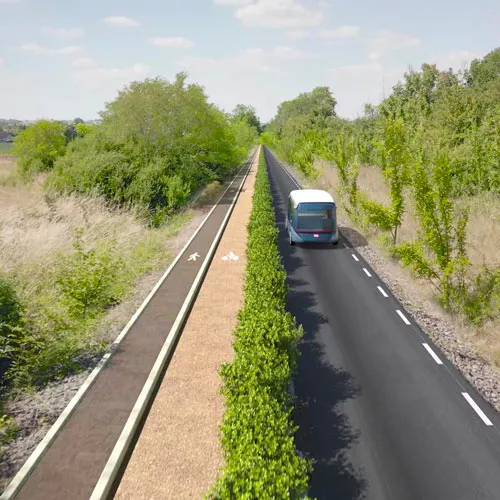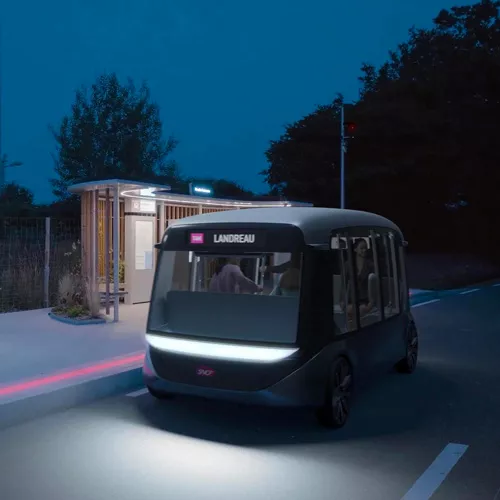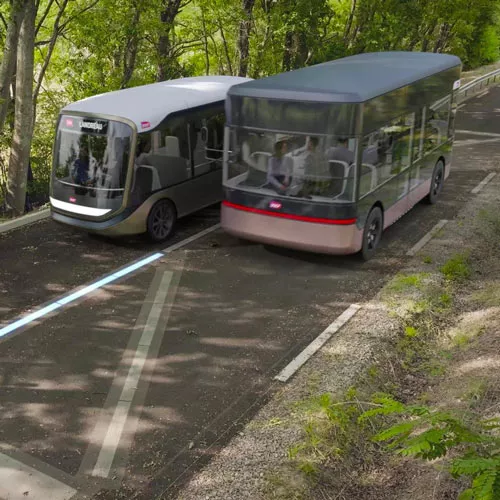
Our autonomous road shuttles for suburban and rural areas
We’re developing an autonomous public road transport service designed to run on former railway lines, bus lanes and greenways. Called MASIPRO, this experimental project aims to offer a practical alternative to private cars in areas where they are still essential to daily life.

What is MASIPRO?
MASIPRO stands for “Mobilité Autonome en SIte PROpre” (Autonomous Mobility in Clean Sites). The project embodies our vision of flexible, accessible public transport for suburban and rural areas.
Led by Tech4Mobility, SNCF Group's innovation accelerator, and supported by Bpifrance, MASIPRO will pilot a high-performance autonomous transport service under real operating conditions. The project—featuring autonomous robotic minibuses—is scheduled to launch in 2027.
Ecology, savings, safety, and performance
Deploying autonomous public transport systems brings multiple benefits:
- flexible service that adapts to local travel needs throughout the day
- enhanced safety through the use of fully dedicated infrastructure
- extended operating hours with controlled operating cost
- reduced environmental impact thanks to 100% electric vehicles with zero CO2 emissions, low noise levels, efficient resource use, and reliance on existing infrastructure
Mobilizing leading industrial players
Led by Tech4Mobility, the MASIPRO pilot brings together a network of leading industrial and research partners including:
- the Railenium and Vedecom research institutes
- beti (a shared autonomous mobility operator)
- Renault group
- Keolis, an SNCF subsidiar

A fleet of autonomous vehicles
To bring this vision to life, the MASIPRO fleet of fully driverless vehicles (Level 4 autonomy) will offer varying passenger capacities and speeds of up to 70 km/h, ensuring flexibility and efficiency in service.

A unique test site in France
One of MASIPRO’s standout features is its dedicated pilot line, created in 2020 on a repurposed railway line. Unique in France, this test site has all the infrastructure needed for autonomous vehicles to operate safely in real-world conditions.
Ideally located, the 4km route connects the residential neighbourhoods of Carquefou—a town near Nantes—with a middle school, high school, sports facilities, and an industrial area that employs thousands of people.
SNCF Group has been testing driverless vehicles here for two years in partnership with Stellantis, and will begin trials with autonomous robotic minibuses in 2027.
We’ve invited Carquefou residents to experience rides in Stellantis' automated vehicles several times. Most tell us they’d happily use this type of transport, especially if it means leaving their cars in the garage.
Director of Autonomous Mobility Projects, SNCF Group

Towards operation in open environments
The MASIPRO project will help develop the technologies, systems, components and services needed to make automated public road transport a reality. By using dedicated infrastructure, it ensures the safety conditions required for the rapid deployment of an efficient automated pilot service.
Once the MASIPRO project is completed (2028), SNCF Group aims to offer Mobility Organizing Authorities fully autonomous transport services operating on dedicated corridors—delivering efficient, reliable and cost-effective mobility.
In the longer term, as technologies mature, autonomous road shuttles will be able to leave their dedicated lanes to serve nearby neighbourhoods, towns and key destinations—making autonomous mobility a part of everyday life.
Share the article